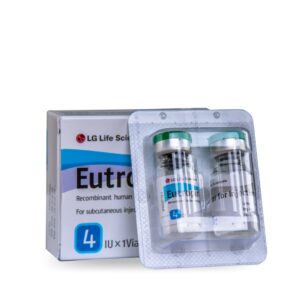Description
Veterelin 10ml
The active substance of Veterelin injection is Buserelin, a synthetic analogue of gonadotrophin releasing hormone (GnRH), however it is 40 to 200 times more effective, and more resistant to the enzymatic degradation due to the substitution of two amino acids .
Veterelin stimulates the synthesis and the release of LH and FSH gonadotrophin in the anterior pituitary gland, increasing their concentration in plasma during several hours. The LH peak leads to the rapid increase of estradiol, progesterone and Pg levels in the follicular liquid, and has a major role on the ovulation process (administration causes the ovulation of the dominant follicle, resulting in a new follicular wave after 2 or 3 days).
Combination of GnRH and PGF2α analogues allows the control of luteal phase and of follicular dynamic that coexist in the ovary, promoting the development of oestrus synchronization schemes that improve the efficiency of its detection and consequently the herd reproduction management. Buserelin Injection 5ml
• Used in cattle, horses, pigs and rabbits
• Induction of ovulation or delayed ovulation
• Improving the conception rate in artificial insemination procedures
Veterelin 10ml Indications
treatment of follicular cysts with or without symptoms of nymphomania.
Compound
Per ml:
buserelin 0.004 mg
equivalent to buserelin acetate 0.0042 mg
Dosage And Administration
Cattle (cow):
Intramuscular, intravenous or subcutaneous
IM is the most appropriate route of administration.
- Treatment of anoestrus and ovulation induction:
20 μg buserelin per animal (equivalent to 5 ml of product per animal), once. - Delayed ovulation:
10 μg buserelin per animal (equivalent to 2.5 ml of product per animal), once. - Treatment of follicular cysts:
20 μg buserelin per animal (equivalent to 5 ml of product per animal), once. - Increased pregnancy rate after insemination, as well as after oestrus synchronisation with PGF2α analogue
10 μg buserelin per animal (equivalent to 2.5 ml of product per animal), once.
However, results may vary depending on breeding conditions.
For oestrus synchronisation in cows based on a fixed 10-day insemination regimen, administer the veterinary medicinal product on day 0, followed by PGF2alpha treatment on day 7, and a second treatment with the veterinary medicinal product on day 9 according to the stated dosage. Vitoline 20ml
Pig (gilt):
Intramuscular, intravenous
IM is the most appropriate route of administration.
- Ovulation induction after oestrus synchronisation with progestogen analogue (altrenogest) to allow a single artificial insemination:
10 μg buserelin per animal (equivalent to 2.5 ml of product per animal), once.
Administer the veterinary medicinal product 115-120 hours after the end of synchronisation with progestogen. Perform a single artificial insemination 30-33 hours after administration of the veterinary medicinal product.
Horse (mare):
Intramuscular, intravenous or subcutaneous
- Ovulation induction for better synchronisation of ovulation with the time of mating:
40 μg buserelin per animal (equivalent to 10 ml of product per animal), once. - Treatment of follicular cysts:
40 μg buserelin per animal (equivalent to 10 ml of product per animal), once.
Rabbit (doggy):
Intramuscular, intravenous or subcutaneous
- Improvement of the fertilization rate:
0.8 μg buserelin per animal (equivalent to 0.2 ml of product per animal), once. - Ovulation induction by postpartum insemination:
0.8 μg buserelin per animal (equivalent to 0.2 ml of product per animal), once
The vial can be punctured a maximum of 20 times.
Waiting times
Beef (cow): meat and offal: 0 dg; milk: 0 hrs.
Pig (sow, gilt): meat and offal: 0 dg
Horse (mare) : meat and offal: 0 dg; milk: 0 dg
Rabbit (female for reproduction): meat and offal: 0 dg


![Equipoise 10ml, Equipoise injection, Equipoise 10ml injection, Equipoise 10ml vial (200mg/ml), SP EQuipoise 10ml vial, Equipoise BD [Boldenone Undecylenate 2500mg] – 10ml, Vita Equipoise 200 mg/ml x 10ml (Boldenone Undecylenate), Boldenone Undecylenate injection, Boldenone veterinary injection, EQUIPOISE 200MG/ML (10ML), Equipoise (Boldenone), Equipoise 10ml for sale, Buy Equipoise 10ml online,Equipoise 10ml EGH,](https://miraducksolutions.com/wp-content/uploads/2023/10/Equipoise-300x300.jpg)


Reviews
There are no reviews yet.